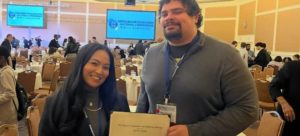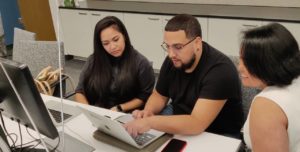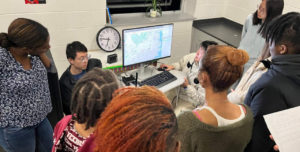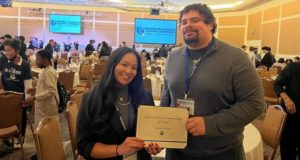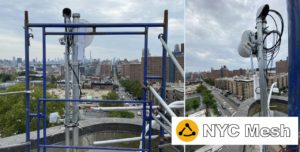One of the main goals of COSMOS testbed is to take advantage of the educational and research experience of its academic partners and transform the testbed-generated research into an innovative learning platform for students. To this direction, COSMOS project focuses on local educational outreach, especially towards minorities underrepresented in STEM.
COSMOS team designed and implemented an educational platform and accompanying toolkit which allow K12 students to learn basic as well as advanced STEM concepts through running experiments either locally or on the COSMOS testbed. The impact of using an advanced research testbed as an educational resource and enabling its access remotely for a large number of students is very significant, especially for schools that lack the technological and instructional resources to prepare students for a future in the digital world.
Taking advantage of this significant asset for hands-on learning, COSMOS is focusing on creating a strong educational outreach program targeting NYC public schools, especially those located in Harlem, which have a high percentage of minority students that are underrepresented in STEM.
COSMOS education plan for K12 is twofold: 1) To create a strong, innovative and concrete set of methods and tools that will enhance STEM education for K12 students in NYC, 2) To work together with STEM teachers, to enhance their professional development and to collaboratively create hands-on educational material for NYC students.
The educational activities of COSMOS will strongly benefit from the involvement of the PAWR consortium companies in K12 activities in the local community. Many of the COSMOS industrial partners have programs that support schools and the community in STEM education improvements. Combining the experience of the COSMOS academic partners on developing educational material based on testbed experiments, with the experience of the industrial partners supporting local communities and schools, will significantly enhance the COSMOS education and outreach program.
The outreach activities and accomplishments of the COSMOS team include the training of 10 NYC teachers within the NSF Research Experience for Teachers (RET) program in Summer 2018, 10 teachers in a joint RET program and NSF EFRI NewLAW Research Experience and Mentoring (REM) program in Summer 2019, and 7 teachers in joint RET/REM virtual program in Summer 2020. The REM/RET program continued during the summer of 2021 when seven returning New York City middle and high school teachers worked on the refinement of lesson plans, slides, videos and labs – to make them better suited for training future teachers. In summer of 2022, 11 new teachers were mentored by 4 teachers who attended the program previously, accomplishing the goal of scaling up the program. In summer 2023, the program recruited 7 returning teachers and 13 new teachers in collaboration with the NSF EFRI NewLAW program and CS3 Engineering Research Center. The experience gained in this program and the program outcomes are summarized in [1],[2] below.
Accompanying accomplishments of the program include the release of the COSMOS Education Toolkit, the deployment of the COSMOS online toolkit, winning a grant from the Verizon 5G EdTech Challenge (for the 5G Covet project), participation in Silicon Harlem’s 5th and 6th Annual Next-Gen Tech Conferences and the NE-ASTE 2018 and 2019 Conferences, engagement of the AT&T Foundation in funding graduate student stipends to support COSMOS-trained K-12 teachers, and selection as finalist in the 2020 GLOMOAwards in MWC Barcelona 2020. The 2019 cohort of COSMOS-NewLAW summer program teacher participants presented at the AAAS/NSF Emerging Researchers National Conference. The 2020 cohort presented at the annual National Science Foundation (NSF) Research Experience and Mentoring (REM) Virtual Meeting on Feb. 2021. Out of the six awards for excellence in presentations given during the meeting, three were awarded to COSMOS-NewLAW teachers. The 2021 cohort of teachers presented their work at the spring 2022 annual NSF REM meeting. The teachers who were the 2022 summer participants made a set of presentations at the 2023 NSF REM gathering, where two educators from the cohort won the top prizes awarded to teachers.
This program is supported in part by REM supplement to NSF award EFMA-1641100 (NewLAW EFRI), RET supplements to NSF awards ECCS-1547406, CNS-1650685, CNS-1650669, CNS- 1702952, CNS-1527750, ECCS-1547332, CNS-1513110, CNS-1730043, CNS-1329939, OAC-1541069, the Columbia Data Science Institute, AT&T foundation, and NSF awards CNS-1827923 (PAWR COSMOS) and OAC-2029295, NSF-BSF award CNS-1910757, and NSF engineering research center award EEC-.2133516.
COSMOS education and outreach program is supported by the NYU Center for K12 STEM Education and Columbia Engineering Outreach Program.
[1] P. Skrimponis, N. Makris, S. Borges Rajguru, K. Cheng, J. Ostrometzky, E. Ford, Z. Kostic, G. Zussman, and T. Korakis, “COSMOS Educational Toolkit: Using Experimental Wireless Networking to Enhance Middle/High School STEM Education,” ACM SIGCOMM Computer Communication Review, vol. 50, no. 4, Oct. 2020. [download]
[2] P. Skrimponis, N. Makris, K. Cheng, J. Ostrometzky, Z. Kostic, G. Zussman, T. Korakis, and S. Borges Rajguru, “Evaluation: A teacher professional development program using wireless communications and NGSS to enhance STEM teaching & learning,” in Proc. ASEE Annual Conference, 2020. [download] [presentation][video]
